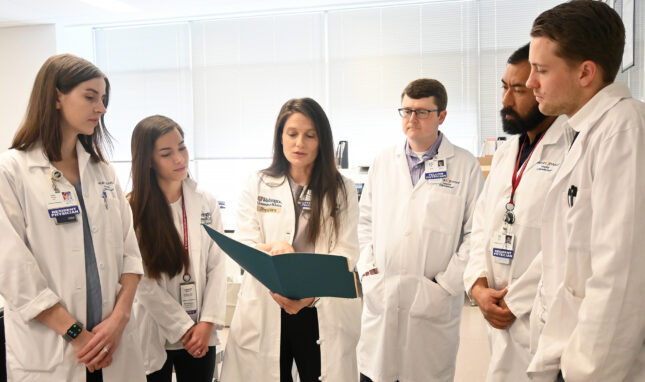
The Anatomic Pathology and Laboratory Medicine Advanced Clinical Rotation provides training in diagnostic pathology and laboratory testing under the supervision of residents, fellows and attending pathologists.
This advanced clinical rotation (ACR) is a 4-week rotation that includes 2 weeks of anatomic pathology and 2 weeks of clinical pathology. ACR students have the same daily schedules as entering first year anatomic pathology/clinical pathology residents. They are assigned the primary workup of patient specimens or patients on each sign-out day. The approach to the specimen or patient and required follow up or ancillary testing is planned in consultation with the resident, fellow or attending physician, using principles of evidence-based medicine. Medical students will be expected to maintain accurate and thorough documentation, and will be provided with feedback to improve these skills throughout the rotation. Some assignments (such as fine needle aspirations (FNAs) in cytology and therapeutic apheresis procedures in transfusion medicine) will place students in direct contact with patients, their families, and members of the care team. In addition, medical students present a case at the end of each experience that demonstrates pathology’s contributions to patient safety and process improvement. The ACR is based at the Center for Advanced Laboratory Medicine in the BJC Institute of Health.
Regardless of their future specialty, medical students will find the ACR in Anatomic Pathology and Laboratory Medicine to be an exciting and enriching experience. Those interested in pathology as a career will have the opportunity to experience the specialty at a level comparable to any other sub-internship. Students applying for residency in other specialties will gain insights into the critical role of pathology and laboratory medicine in their field of choice. Below are a few examples of how the ACR in pathology and laboratory medicine might relate to a range of specialty interests:
- See the impact of intraoperative sampling on real-time surgical care
- See how resected tissues are oriented, sampled, and evaluated for diagnosis and prognostication
- Understand the workflow, limitations, and determinants of turnaround time in pathology
- Understand the language of uncertainty as expressed in pathology reports
- Understand how biopsy sampling (e.g., bone marrow, GI, lung, liver, kidney) can impact pathology workup and subsequent care
- Gain insight into and familiarity with transfusion medicine (blood banking, practical implications of transfusion, apheresis medicine)
- Understand the workflow and potential caveats in molecular, chemical and microbiologic testing
- Promote high-value care via appropriate lab utilization
- Learn caveats of complex laboratory testing ordered during neurological workups, e.g., genetic testing
- Gain experience with therapeutic apheresis for neurologic conditions
- Gain insight and familiarity with transfusion medicine (blood banking, practical implications of transfusion)
- Learn about molecular and genetic testing for prenatal diseases
- Understand clinical implications of specific pathologic diagnoses for obstetrical and gynecologic patients
- Effectively access surgical pathology services including frozen section
- Understand how and why toxicology testing is performed and its impact upon patient care
- Understand therapeutic drug monitoring
- Interact effectively with cytopathology for sampling during interventional radiology procedures
- Understand the relationship between line placement and urgent apheresis procedures
- Correlate radiologic findings with laboratory data to work up transfusion reactions
- Perform radiographic/pathologic correlation (e.g., in breast screening and marker placement/tumor localization)